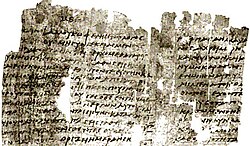A call to faithfulness (3:7–4:13)
Verse 7
- again He designates a certain day, saying in David, "Today," after such a long time, as it has been said:
- "Today, if you will hear His voice,
- Do not harden your hearts." [7]
The Hebrew version of Psalm 95 names no author, but David is explicitly said to have written these words from Psalm 95:7–8, which happened long after the Israelites already enjoyed rest and were established in Canaan under the leadership of Joshua. Therefore, this day ("Today") is another day in the future for God's people to enter a heavenly rest, beyond the enjoyment of life in the land of Israel.
Verse 8
- For if Joshua had given them rest, then He would not afterward have spoken of another day. [10]
The "rest" experienced by the Israelites in the time of Joshua was 'an earthly anticipation of the ultimate, heavenly rest', an old covenant promise which is fulfilled in a transformed way by Jesus Christ.
Verses 11-13
- 11Let us try as hard as we can to enter God's rest so that no one will fail by following the example of those who refused to obey. [11]
Verses 12-13 contain a warning demonstrating "the necessity for compliance with this exhortation": [12]
- 12For the word of God is living and powerful, and sharper than any two-edged sword, piercing even to the division of soul and spirit, and of joints and marrow, and is a discerner of the thoughts and intents of the heart. [13]
- 13Nothing in all creation is hidden from God. Everything is naked and exposed before his eyes, and he is the one to whom we are accountable. [14]
Many Church Fathers and later theologians have identified "the word of God" with the Son of God. Protestant theologian Heinrich Meyer notes that in Hebrews 1:2 there is confirmation that "in these last days [God] has spoken to us by his Son", [15] but argues that the present wording cannot be read in this way because when Hebrews was written, "the expression was too unusual for it to be employed and understood [in this way] without further indication". In his opinion it therefore must have a more broader meaning, quite generally: "that which God speaks". [12]
This page is based on this
Wikipedia article Text is available under the
CC BY-SA 4.0 license; additional terms may apply.
Images, videos and audio are available under their respective licenses.
